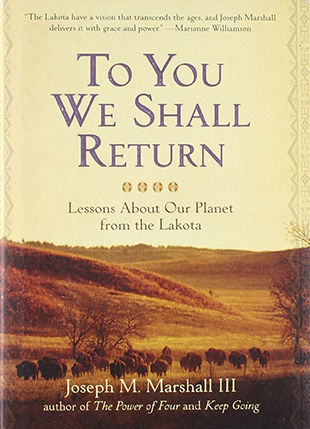"A custom among several northern Plains tribes is an indicator that indigenous people before the nineteenth century were indeed aware of their impact on the natural environment, and regarded the earth as something more than a supply source. Hunters left offerings after killing animals, usually a bundle of tobacco or prairie sage. Some verbally gave thanks and then asked for forgiveness from the animal. As a matter of fact, indigenous people everywhere had similar traditions and practices. Modern-day Inupiaq whale hunters pray after killing a bowhead whale, giving thanks to God and the whale. One hunter spoke of how the whale was a gift from God and that they were able to harvest it because the whale 'gave itself' to the hunters.
"Hand in hand with offering thanksgiving, hunters actually humbled themselves in the presence of the dead animal, taking a moment to honor the life they had taken.
"Such traditions of preparation and thanksgiving were not restricted to animals. Gifts were offered in return for many things taken or harvested from the land. When a Lakota bow maker cut a tree that would become a bow, he too left an offering. He also might pray before cutting the tree, asking for the privilege of taking it. He knew and understood that the tree was a living entity with just as much right to life as any form of life on the earth. That knowledge and understanding arose out of the realization that life was the common reality. Anything and everything that was alive was connected to all else that was alive. That was the connection, the unavoidable reality. The common denominators were birth and death. All living things come into the world, whether we hatch from eggs, grow from seeds, or emerge from the womb. And in the end, after we have fulfilled our purpose — or at least have had the opportunity to do so — we are claimed by death. Nothing or no one can circumvent that reality, not the least and the weakest among us nor the strongest and the greatest. And it is that reality that makes us all equal to one another, but not the same."
